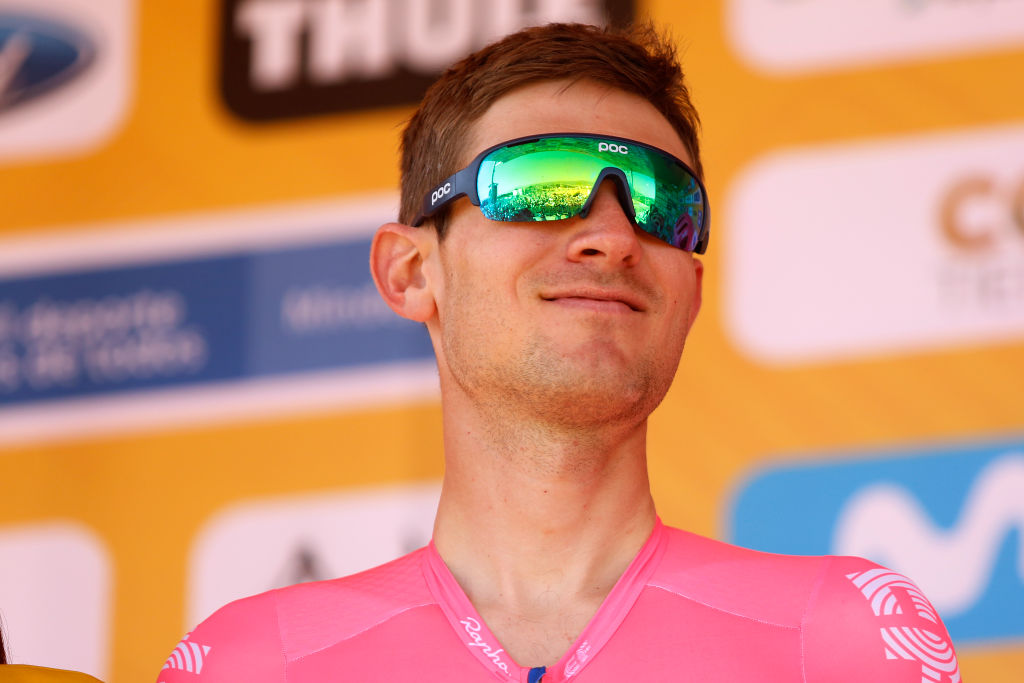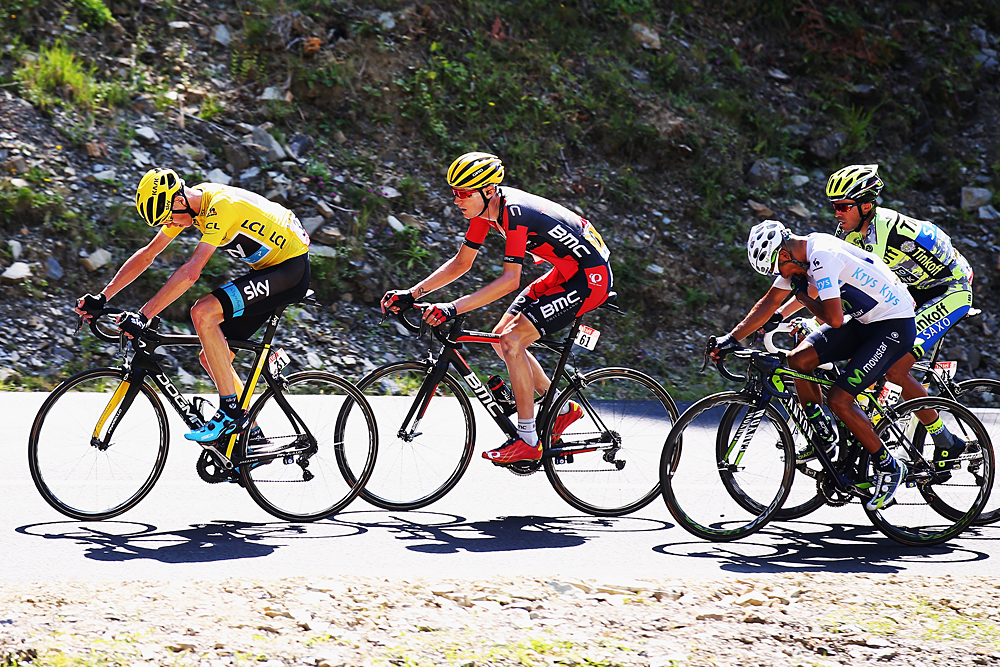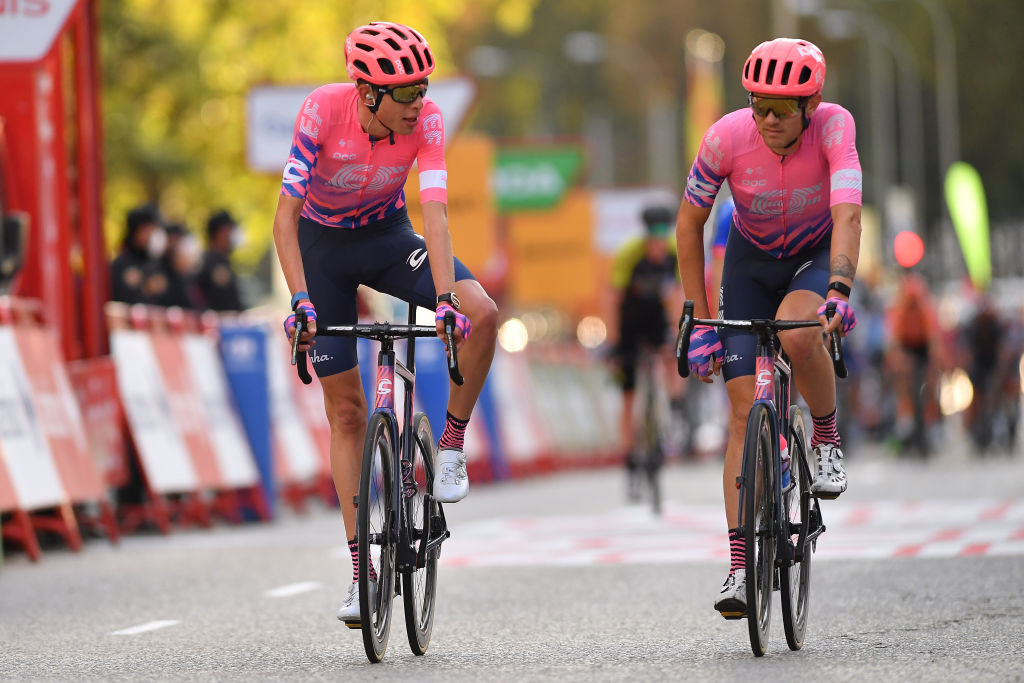Tejay van Garderen: Letting go of the past
Procycling magazine speaks to the American about is relationship with the Tour de France

Tejay van Garderen has experienced both the highs and lows of cycling. But at the same time he’s been remarkably consistent throughout. Procycling magazine caught up with the rider last summer as he prepared to ride the 2020 Tour de France.
This article was taken from Procycling magazine issue 271, August 2020.
The Tour de France is cycling’s most important event. Tejay van Garderen gets that. Without it, he says, cycling might be akin to swimming, a sport that has its heyday every four years but is largely forgotten about the rest of the time. Yet when it comes to his own relationship with the biggest bike race in the world, it’s perhaps unsurprising that Van Garderen sounds a little conflicted.
“No matter how you…” Van Garderen starts, as he speaks to Procycling from his home in California, “I’m trying to find the right words…” he pauses again, “...perceive the Tour, feel about the Tour, you have to recognise that the Tour is that important and you’ve got to show up and you’ve got to take your shot.”
With one exception - 2017, when he rode the Giro and Vuelta - Van Garderen has lined up for the Tour every summer since he made his debut in 2011 as a 22-year-old in his second year as a pro. He’s due to be there again in Nice on August 29, all being well. It’s one of only two races so far written on his schedule when the 2020 season resumes later this summer, along with the Critérium du Dauphiné. You get the impression the Tour is a race Van Garderen can’t always live with, but also clearly can’t live without.
The Tour can be cruel. Not just the physical and mental effort it takes to complete the three weeks of racing and make it to Paris, but in the way it can knock down riders as fast as it can build them up. Everything that riders achieve at the Tour is amplified - the flipside being, any time they fall short it’s similarly inflated. Van Garderen has perhaps learned this more than most. The 31-year-old started his career so strongly he was quickly seen as America’s successor to Lance Armstrong, a Tour champion-elect. It was a matter of when, not if he would win the yellow jersey. He’s since spent the best part of the rest of his career explaining why that prediction hasn’t turned to reality so far. Even more so when you consider that’s been done through the lens of social media, where everyone can have an opinion.
The latest race content, interviews, features, reviews and expert buying guides, direct to your inbox!
At his first Tour, Van Garderen rode for HTC Columbia. He’d had a promising spring that included fifth place at the Tour of California and 11th at the Tour de Suisse. Team-mate Mark Cavendish was the team leader, and the fastest sprinter in the world, and the young Van Garderen spent most of the race helping pull back breakaways or jumping into the lead-out, as Cavendish cruised to five stage wins and the green jersey. Van Garderen did get a little freedom, getting into the breakaway on stage 8 and earning the KoM jersey for a day. “In that Tour I was more just soaking it in, and enjoying the experience… living out a boyhood dream of being in the Tour,” he recalls.
But it all changed a year later, after a transfer to BMC, when Van Garderen bettered his team leader - and the Tour’s defending champion - Cadel Evans by coming fifth. Evans, the rider Van Garderen was due to be working for, languished four minutes behind him in seventh having faltered and lost time as the stages went on. In Paris, Van Garderen was also awarded the white jersey for the best young rider. He was a star in the making. Two years later, at the 2014 Tour, Van Garderen repeated his fifth place finish in the general classification, to reaffirm his status.
But to date, that remains his highest grand tour placing. Van Garderen struggled to live up to the hype in the years that followed.
“I ended up in fifth place, so that was just a big shock, I wasn’t expecting that going in. I was able to reconfirm that fifth place with another fifth place in the 2014 Tour, and I don’t know, since then I felt like I needed to break through to that next level,” Van Garderen says. “Now it’s like, podium or actually challenge for the victory rather than follow wheels into a top five or a top 10. And I think I was hellbent: how do I break through to that upper echelon and be considered a serious GC contender, rather than just a follower who can stumble into a high position? I think I had the wrong outlook. I think I should have followed the progression and realised that I was still a young rider and still evolving and stayed on course, rather than trying to force it.”

In 2015 Van Garderen had to abandon the Tour with illness on stage 17, while sitting in third place overall just 22 seconds behind Nairo Quintana in second. In 2016 he was named joint leader with Richie Porte, but never looked a real contender, falling out of the top 10 on stage 17 and bleeding more time on the final two mountain stages to finish 29th.
By the 2017 Giro, a race that was meant to get Van Garderen back on track, the years of frustration were visible. After losing time on three consecutive stages, plummeting to 25th overall, he looked broken, telling Velonews in an interview he wasn’t sure if he wanted to be a GC rider any more.
Were the expectations and pressure too high? “I don’t think it’s fair to blame fans for expecting or media,” Van Garderen says. “I think when I really look back on it I brought a lot of that on myself. When I look back at interviews I did, I was the one saying, ‘Now it’s time for a podium, now it’s time to step up and really compete in these races rather than follow the best guy I can.’ I was putting that burden on my own shoulders.
“That’s the thing about this sport. You can come in as a huge hotshot but you’re always going to get humbled. You come across the rider who’s better at that time, or you can crash or you can get sick; there are so many things. I think it’s good to be confident but I don’t think it was maybe good to project that out into the public the way I did, I should have just stayed quietly confident.”
Since 2017, Van Garderen has moved to a support role at grand tours - for Porte and for Rigoberto Urán last year after he moved to EF Pro Cycling. He doesn’t go as far as to say it was a conscious decision to abandon any grand tour ambitions for the GC, but there’s clearly been a freedom that’s come with accepting his current role.
“At a certain point, like I said, you kind of just get humbled. If I were to run my mouth and say, ‘I want to go to the Tour and I want the team built around me and I want to be the sole leader, I’d get laughed at,” Van Garderen says.
“Part of it is just, okay, right now this is what it is. I still want to be a bike racer and I still feel that I have a lot to contribute but at the same time I understand bike racing and I understand where I am in the pecking order and, yeah, I accept that. I understand it. It does relieve pressure. If I don’t have my best race it’s not like I’m letting the team down, or letting everybody down. Someone else is there to pick up the slack. There’s a little bit of that but there’s more an understanding of, okay, this is where I’m at at the moment.”

The Tour is all-encompassing and often success is measured through its prism. So for all that Van Garderen’s disappointments in the Tour might make headlines, that shouldn’t detract from his successes elsewhere and the fact that he is the most successful American rider of his generation. His palmarès features 16 victories, including a stage win at the Giro, wins in Catalunya, Ruta del Sol and the Tour de Suisse and GC wins at the USA Pro Challenge and Tour of California. He’s finished in the top five overall of at least one WorldTour stage race every season going back to 2012. Notably, last year he was second at the Dauphiné behind Jakob Fuglsang, his biggest result since his Giro stage win in 2017 and perhaps no coincidence.
“I’ve lacked a bit of consistency over the last few years but if you take the top results of the last three years, I don’t think I should be too surprised I was able to do that,” he says. “In 2019 I was second at the Dauphiné, the year before that I was second to Egan Bernal in the Tour of California, won the TT there, and then you take 2017; I was 10th at the Vuelta, won a stage at the Giro. 2016 I was top 10 in a bunch of WorldTour races.
“I’m happy with it, it more just shows that it’s still in me and it’s a confirmation that I’m still the same rider but I wouldn’t say that it’s a big shock that I was up there.”
The transfer to ‘home’ team EF Pro Cycling last year, after seven years at BMC, has been a good fit, reuniting him with manager Jonathan Vaughters, who he rode for as a junior, and riders such as Alex Howes, who he’s raced with his whole life on the national team. In a team where 13 riders are aged 25 or under, he feels he has a lot to offer the likes of Sergio Higuita, particularly his speciality of time trials. “I’ve taken a lot of pride in being able to do that, rather than just with the focus of getting results for myself,” he says.
But don’t assume that means he’s putting himself out to pasture. Van Garderen insists he’s got plenty of fire still in him to challenge for his own ambitions.
“I’m still hungry for results for myself,” he says. “I’m not saying I want to go to a grand tour and have the team work for me or anything, but if the opportunity arises, no matter where it is, I still want to take it and I still think I can add to my palmarès. It’s not just, ‘now it’s time for the next chapter, now it’s time for the mentor role, I’m no longer that guy.’ I think I can do a bit of both.”
Procycling magazine: the best writing and photography from inside the world's toughest sport. Pick up your copy now in all good newsagents and supermarkets, or get a Procycling subscription.
Sophie Hurcom is Procycling’s deputy editor. She joined the magazine in 2017, after working at Cycling Weekly where she started on work experience before becoming a sub editor, and then news and features writer. Prior to that, she graduated from City University London with a Masters degree in magazine journalism. Sophie has since reported from races all over the world, including multiple Tours de France, where she was thrown in at the deep end by making her race debut in 2014 on the stage that Chris Froome crashed out on the Roubaix cobbles.